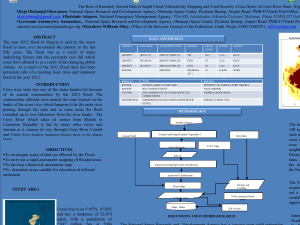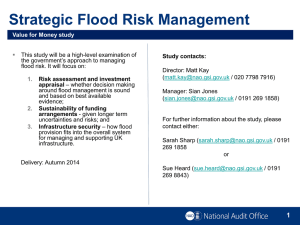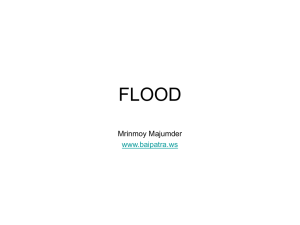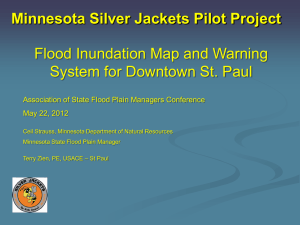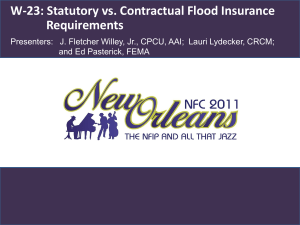W42 - NFIPiService.com
advertisement
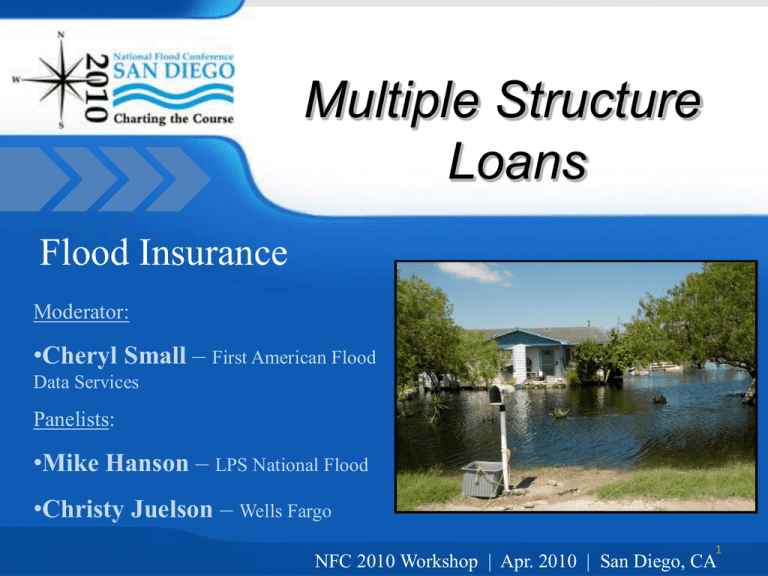
Multiple Structure Loans Flood Insurance Moderator: •Cheryl Small – First American Flood Data Services Panelists: •Mike Hanson – LPS National Flood •Christy Juelson – Wells Fargo 1 NFC 2010 Workshop | Apr. 2010 | San Diego, CA Disclaimer This presentation does not represent the views of the presenters’ employers, nor has it been approved by any governmental agency. It is recommended that you consult with your own attorney and/or compliance professional before implementing any changes to your program. 2 Agenda • Lenders’ Regulatory Responsibility • How Lenders comply with requirements • Flood Determinations for multi-zone properties 3 Lenders’ Regulatory Responsibility Question 14 • Is flood insurance required for each building when the real estate security contains more than one building located in a SFHA in a participating community? YES 4 Real Estate Security Containing Multiple Buildings Lender must ensure that multiple buildings located in a SFHA have flood insurance The policy type depends upon the building being insured: • Dwelling Form issued when you are insuring a single-family or a two-to-four-family dwelling Includes 10% coverage for detached garages • General Property Form used for all other buildings (except condos) 5 Real Estate Security Containing Multiple Buildings • Examples of buildings covered under the General Property Form: - pool house - club house - barns - machine sheds - grain bins - silos - churches - schools - mercantile structures - agricultural & industrial structures - mixed use building with < 75% residential square footage 6 Real Estate Security Containing Multiple Buildings Some WYO carriers will insure multiple buildings at the same location under a General Property Form Scheduled Building Policy. - fewer policies to track - only savings to customer would be the $35 Federal Policy Fee Inter-Agencies agree lenders should have some reasonable method to establish values where multiple buildings are collateral for a single loan. Methods may include: - allocation by square footage - split on a pro-rata basis based upon RCV (keep in mind that property covered under the General Property Form is ACV coverage only) - functional value 7 Coverage Amount Requirements “The lender must determine the amount of insurance required on each building and add these individual amounts together” To be compliant, the total amount of flood insurance must be (at least) the lesser of: – The outstanding principal balance of the loan(s); or – The maximum amount of insurance available under the NFIP, which is the lesser of: • maximum limit available for the type of structures, or • the “insurable value” of the structures Coverage for buildings is separate from the amount of recovery if the building is destroyed The total amount of flood insurance required can be allocated among buildings in varying amounts, but all buildings in an SFHA must have some coverage 8 Coverage Amount Requirements Two alternatives may become available when RCV would result in over-insuring of the building. Amount of insurance is determined by the lender and/or borrower: – “Functional Building Cost” The cost to replace a building with a lower-cost functional equivalent. Allows for the replacement of a building with less costly construction materials that are functionally equivalent to obsolete, antique, or custom construction materials – “Demolition/Removal Cost” The cost to demolish the remaining structure and remove the debris. This approach is suggested when the building would not be replaced if damaged or destroyed by flood 9 Coverage Amount Requirements - Examples Example 1: Lender makes a loan in the amount of $350,000 with the following structures listed on the appraisal for the property: - Primary dwelling value - $425,000 Detached guest house value - $33,611 Barn value - $24,000 Machine shed value - $500 What is total amount of flood insurance required? Primary Dwelling $250,000 Detached Guest House $ 33,611 Barn $ 24,000 Machine shed $ 500 Total Coverage $308,111 $308,111 in coverage is required to meet the minimum standard of the lesser of total lien(s) or insurable value, up to the maximum NFIP coverage 10 Coverage Amount Requirements - Examples Example 2: Lender makes a loan in the amount of $145,000 with the following structures listed on the appraisal for the property: - Primary dwelling value - $200,000 - Barn, Silo, Tool Shed – Combined value $45,000 To be compliant, the total amount of flood insurance required is $145,000 Some amount of coverage is required for each building. Minimum coverage may be established based upon alternate methods mentioned previously: • Square Footage • Functional Value • Split on a pro-rate basis based upon insurable value 11 Flood Determinations • Common: Properties with multiple structures in the same flood zone = 1 flood certificate for loan • Exceptions: Properties with multiple structures in different flood zones 12 Multi-Structure & Split-Zone Properties • Typically identified after flood determination is complete - property is in a SFHA & insurance is required • Borrower doesn’t think insurance should be required – borrower built house to federal standards – Borrower has multiple structures on property • Barn • Shed • Boat house • Guest house •etc. 13 Multi-Structure & Split-Zone Properties • Additional information is provided to determine: – where the specific structures are located on the property – what flood zone each structure is located in • Multiple Flood Certificates example – House in zone X – Barn & shed in zone A – flood insurance required 14 15 16 17 18 19 Questions? 20

